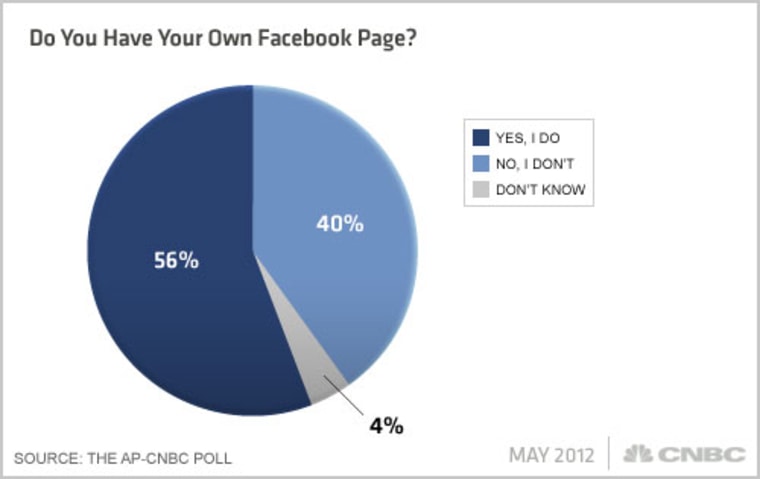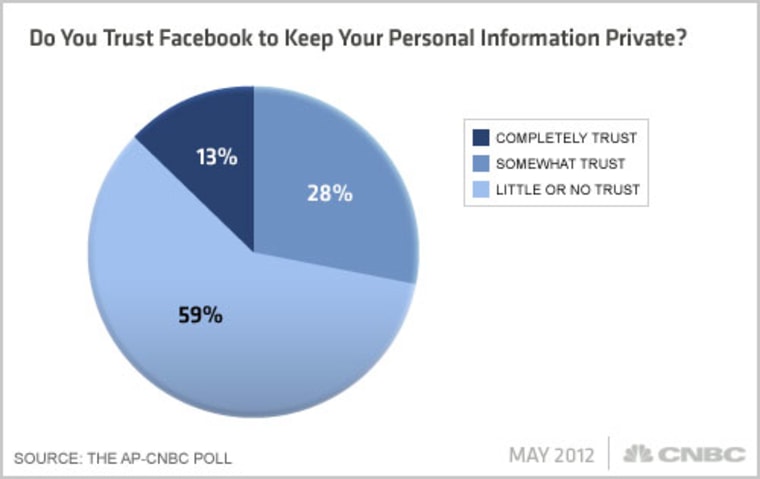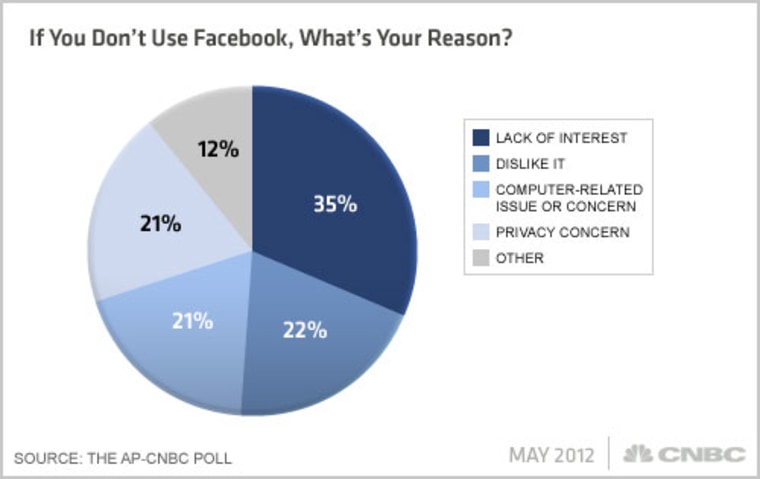We've long known more than a few Facebook users don't trust the social network to keep their personal information private. We know this because each and every time a new Facebook privacy kerfuffle hits the news, that's all we talk about in our status updates ... on Facebook. You know, that social network we don't trust with our information. Now, a new AP-CNBC poll has the statistics to support our long-held supposition.
Sixty percent of the 1,004 polled by AP-CNBC had a Facebook account — even though more than half of the respondents also said they "have little or no faith in the company to protect their privacy," according to the poll, some details of which were shared Tuesday in msnbc.com's Business section.
Perhaps you think the lion's share of distrust belongs to those respondents who who don't use Facebook — after all, they made up 40 percent of the people polled. However, only 21 percent of non-Facebook users claimed privacy concerns as their reason for not joining the social network. And another 21 percent of the non-Facebook users said they "dislike it," perhaps for privacy reasons.
So it breaks down like this: A large number of people who — voluntarily — put their personal information on Facebook claim that they do not trust the social network with their personal information. In fact, they trust Facebook a whole lot less than people who avoid it altogether. Maybe Facebook would worry about it's upcoming IPO if 59 percent of U.S. users quit the social network out of mistrust, but as the numbers reveal, nobody's going anywhere.
Here's what we're talking about:

A majority of Americans say they have a Facebook page (56 percent), up from 48 percent in a Gallup/USA Today poll last fall.
- About 3 in 10 say they use Facebook every day.
- Younger adults are the heaviest users, with a third (32 percent) of those under age 35 saying they visit Facebook several times a day. Most in this age group (55 percent) report using Facebook daily.
- Among senior citizens, 73 percent do not have a Facebook page, and 47 percent of baby boomers say they don’t have one.

Very few people who use Facebook say they trust the site with their personal information.
- Just 13 percent say they trust Facebook completely or a lot to keep their personal information private.
- A large majority (59 percent) say they have little or no faith in the company to protect their privacy.

Among those who do not have a Facebook page, 35 percent said they simply lack interest in it, preferring to spend their time on other activities.
- Twenty-two percent avoid it because they think it’s a bad thing, inappropriate, or not for people their age.
- Another 21 percent said they are not on Facebook because of computer issues; the same percentage of people opt out due to privacy concerns.
- Demographic breakdowns of those who do not use Facebook are very similar to the results to those who have Facebook accounts.
VOTE: Privacy concerns? Why are you still on Facebook?
So why are we still on Facebook if we don't trust it? Overt maladaptive narcissism? Versions of that delightful old chestnut populate much of the comments on msnbc.com's Market Day report on Facebook's public offering (the largest Internet deal in history, in case you somehow missed it.)
"Facebook is a testament to the inflated human ego," wrote one such commenter. "Yes I had an account and instead of network with friends I was blasted with endless idiotic posts about where people are having dinner. Every picture of their children ever taken and personal 'moonbeam' beliefs. Now I don't want to talk to a majority of people I once considered friends."
And according to another, "Facebook is absolutely the most useless space on the Internet. The fact that anything so ridiculous will be valued at billions of dollars shows how pathetic this society is rapidly becoming."
Hey, I'm as much a misanthrope as the next hermit, but I've seen enough to know we all don't fit the narcissistic personality disorder diagnosis. In a Red Tape Chronicles report on the social media divide, Alessandro Acquisti, an economist who studies privacy at Carnegie-Mellon University, told Bob Sullivan, "The privacy issue may be polarizing because the penalty for avoiding social networks is becoming more severe over time."
Acquisti continued: "Not having a mobile phone now would dramatically cut you off from professional and personal life opportunities. It's the same story with social networks."
We all are inevitably locked in, he says. "The more people use them for socializing and for their professional life, the more costly it becomes for others (who aren't members) to be loyal to their views."
One msnbc.com commenter weighed the cost and benefits, and like many, found it worthwhile. "I live in Europe, and my family is in the U.S., all over in fact. Not to mention the friends I have around the world. It is much easier for everyone who is important to me to be on one site, where I share information ONCE and its done. I am happy many of you seem to have so much time (and money) to individually email or call or visit all the people you care about in your life, but many of us don't."
Facebook. It's like every hinky relationship you've ever had — you sense something is up, but ultimately, you're not going to do a thing about it (until maybe it's too late). So consider the upcoming IPO like your couples counselor. Once the company goes public, every privacy investigation or court subpoena becomes a matter of public record. So your privacy may not be more secure, but at least Facebook will be held a bit more accountable for its behavior.
VOTE: Privacy concerns? Why are you still on Facebook?
Helen A.S. Popkin goes blah blah blah about online privacy, afterwards asks we to join her on Twitter and/or Facebook. Also, Google+. Because that’s how she rolls.